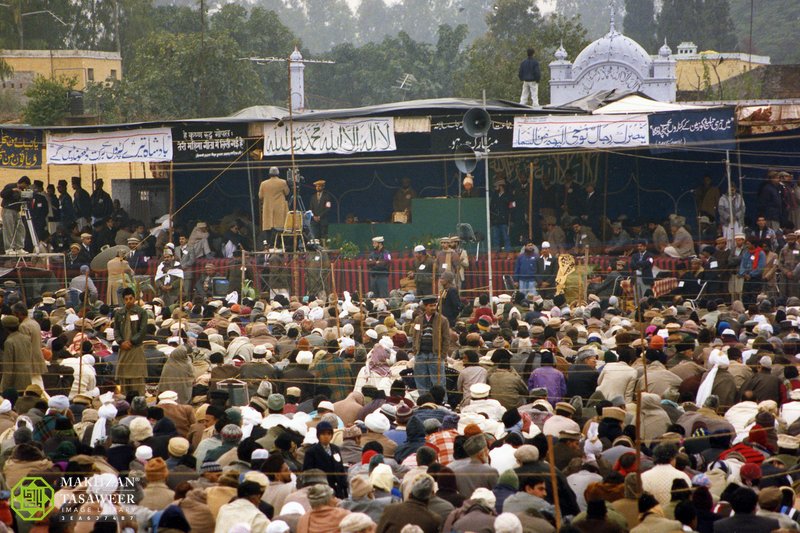A glimpse into the rich history of the Ahmadiyya Muslim Jamaat

22 December 1893: On this day, the Promised Messiahas replied to a letter he received from Hazrat Munshi Rustam Alira. In his letter, this noble companion stated that he desired to have a coat prepared for the Promised Messiahas. The Promised Messiahas replied that it would be better that he prepare quilts for guests of Qadian instead.
Hazrat Sheikh Yaqub Ali Irfanira says that this letter had no date mentioned, but the stamp was dated 22 December 1893. Moreover, he added that this letter exhibited Huzoor’sas hospitality to guests. Hazrat Munshi Rustam Alira wrote to Huzooras expressing his desire to provide him ease, but setting aside his own comfort, Hazrat Ahmadas instructed Munshi Sahibra to prepare quilts for his guests. This shows how Huzooras undertook the moral training of his Companionsra. (Maktubat-e-Ahmad [2019], Vol. 2, p. 598)
22 December 1956: A telephone exchange was set up in Rabwah and started operating the following year. On page 4 of the 30 December 1956 edition of Al Fazl, the Nazir-e-A‘la, Hazrat Mirza Aziz Ahmadra (grandson of the Promised Messiahas) informed residents of Rabwah that telephones had been installed at the Jamaat’s offices and some residential houses. Thus, the connection between the Markaz and the whole world became easier. (Tarikh-e-Ahmadiyyat, Vol. 18, p. 374)
22 December 2013: On this day, Hazrat Khalifatul Masih Vaa condemned the attack on Islam by Geert Wilders, a Dutch politician. In a highly disturbing and provocative act, the leader of the PVV Party in Holland escalated his campaign against Islam by placing a crude and grotesque sticker on the door of his parliamentary office. (“Global Muslim Leader Condemns Latest Attack on Islam By Dutch Politician Geert Wilders”, www.pressahmadiyya.com)
23 December 1926: Swami Shraddhanand was assassinated on this day. He was an Arya Samaj missionary who propagated the teachings of Dayananda Saraswati and played a key role in the Sangathan and Shuddhi movements in the 1920s. Ahmadi viewpoint on this killing can be read in Hazrat Khalifatul Masih IIra Jalsa Salana speech delivered on 27 December 1926. Hindu newspapers used to call Shraddhanand the second Lekhram. (Tarikh-e-Ahmadiyyat, Vol. 4, p. 567)
24 December 1902: On this day, Al Hakam reported, “On the night between 21 and 22 December, which was the first night of the last ten nights of Ramadan, the Promised Messiahas received the revelation:
يَأْتِيْ عَلَيْكَ زَمَنٌ كَمِثْلِ زَمَنِ مُوْسٰي
“[A time is coming for you which will be like the time of Moses.] The Promised Messiahas said, ‘I have not received this revelation before during this period of 24 or 25 years, even though I have been given the name Musa [Moses] several times in divine revelations.” (Tadhkirah [English], p. 605)
25 December 1922: Following a proposal from his second wife, Amatul Haye Sahibara, Hazrat Musleh-e-Maudra established Lajna Imaillah on this day and appointed her as its first secretary. Since its inception, it has remained a worldwide academic, religious and community organisation for Ahmadi women. (Tarikh-e-Ahmadiyyat, Vol. 4, p. 303)
25 December 1930: Hazrat Mirza Sultan Ahmad, the eldest son of the Promised Messiahas, took bai‘at at the hand of Hazrat Musleh-e-Maudra. Though he did not perform bai‘at during the life of the Promised Messiahas, he would passionately defend the Promised Messiahas event during that period. (Tarikh-e-Ahmadiyyat, Vol. 5, p. 237)
25 December 1947: Quaid-e-Azam, Muhammad Ali Jinnah, Governor General of Pakistan, appointed Hazrat Chaudhry Sir Zafrulla Khanra as the first foreign minister of the country. (Tehdis-e-Nemaat [2009], pp. 645-646)
26 December 1933: Jalsa Salana coincided with the holy month of Ramadan. Around 400 people took bai‘at during Jalsa. Hazrat Musleh-e-Maudra delivered addresses on all three days despite fasting, without loudspeakers. (Tarikh-e-Ahmadiyyat, Vol. 5, p. 130)
26 December 1982: On this day, the inaugural Jalsa Salana of the blessed era of the Fourth Khilafat commenced in Rabwah. Hazrat Khalifatul Masih IVrh graced the event with his spiritually uplifting speeches throughout the three days. Despite heavy rain on the concluding day, the Jalsa proceedings continued uninterrupted, with a remarkable attendance of approximately 220,000, including representatives from 27 countries who journeyed to Rabwah, Pakistan. During this historic Jalsa, Huzoorrh delivered the heartening news that the Jamaat had established missions in 28 countries, where 391 missionaries were diligently serving. With the Markaz’s invaluable support, 24 new mosques had been constructed across nine countries, and additional mission houses had been established in 8 different countries. Additionally, 25 magazines and newspapers were being meticulously prepared and printed worldwide by Jamaat. Huzoorrh expressed his desire for the circulation of Al Fazl and The Review of Religions to reach a minimum of 10,000. (Silsila Ahmadiyya, Vol 4, p. 861)
27 December 1960: The chief justice of India was given Ahmadiyya literature when he visited Tarapur in Palghar district in the Indian state of Maharashtra. Maulvi Abdur Rahman Fani Sahib, a local missionary of the Jamaat, presented an address on behalf of the Jamaat. (Tarikh-e-Ahmadiyyat, Vol. 21, p. 9)
28 December 1928: Jamaat-e-Ahmadiyya Australia convened its Jalsa Salana, which was the first-ever Jamaat gathering in that part of the world outside India. Hazrat Sufi Muhammad Hassan Musa Khanra, the pioneering Ahmadi of Australia, narrated the claims of the Promised Messiahas. By the grace of Allah, this proved to have a very great impact on all those present. (Tarikh-e-Ahmadiyyat, Vol. 5, p. 100)
28 December 1991: On this day, the historic Jalsa Salana Qadian concluded, which commenced on 26 December. Hazrat Khalifatul Masih IVrh gracefully inaugurated the event at 10 am on 26 December. During his Friday Sermon on the second day of the Jalsa, Huzoorrh heralded the commencement of the new Waqf-e-Jadid year, and later that day, he delivered a profound address to the Lajna at the ladies’ Jalsa Gah. (Silsila Ahmadiyya, Vol 4, p. 868)

